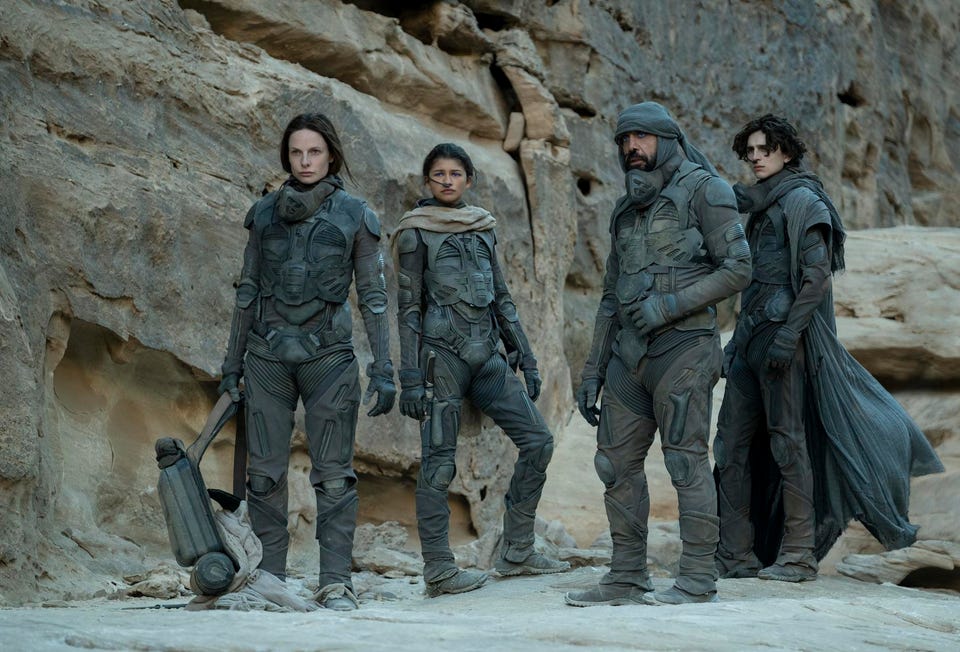
Dune is a legendary science fiction novel that is almost equally legendary in cinematic circles for being nearly impossible to adapt for the big screen. There have been attempts of varying levels of misstep from legends of the director’s chair, but not one that has hit the mark even as other sci-fi tales influenced by have gone on to become influential film classics and pop culture phenomena. The latest Captain Ahab to attempt conquering this white whale is one of the best directors in Hollywood at the moment, an auteur that has already shown an adeptness at nailing different types of films including beloved sci-fi classics. Now that Dune is finally here, does it live up to the hype and expectations?
For those who are unfamiliar with the series of books, the main protagonist is Paul Atreides (Timothée Chalamet), a brilliant and gifted young man born to the House Atreides, led by Duke Leto Atreides (Oscar Issac) with his cocubine and Paul’s mother Lady Jessica (Rebecca Ferguson) at his side. As the House Atreides prepares to take over control of the desolate and dangerous planet Arrakis and its valuable reserves of the substance called spice from the brutal and powerful House Harkonnen at the behest of the Emperor, Paul begins to feel the pull of a great destiny beyond his understanding. As the Harkonnen eventually attacks House Atreides in retaliation for the loss of Arrakis, Paul must conquer his fear and navigate the dangerous sand planet, and its mysterious inhabitants the Fremen, under the guidance of his mother to survive and begin the path toward facing his destiny.
Dune is a film that was produced on a chance. Warner Bros and director Denis Villeneuve moved forward with shooting it as the first of two parts without having simultaneously filmed the sequel, hinging its future on the success of this first entry. Thus, it makes sense that much of what we see consuming the thoughts and actions of Dune’s characters is the fear of an uncertain future, manly from Paul and his mother Lady Jessica. For Paul, he is being tugged from two sides, the first as the heir to a powerful family and accomplished man in Duke Atreides whom he worries about having to live up to, and secondly from his visions involving a mysterious young girl, his participation in battles, death, and what it all means regarding his destiny. Lady Jessica on the other hand is driven by her membership, and devotion toward, the Bene Gesserit, a shadowy religious order focused on using political machinations combined with their soothsaying powers to manipulate society toward a new, more enlightened order. The visions of her order that hint toward Paul’s possible importance in this order create a similar anxiousness in Lady Jessica as to Paul’s fate. This particular through line regarding the crushing worry of duty and our place in the world works to make Paul a relatable character for many in the audience, particularly the younger fans which Warner and Villeneuve certainly hope to entrance with the franchise. At some point in all of our lives we have faced a crossroads regarding whom or what we were going to grow to be and Dune drives this point home emotionally while entertainingly interweaving it with sci-fi elements.
Chalamet also performs capably in the lead offering an empathetic performance as a young man caught at a crossroads and executing the call to properly portray the emotional turmoil called for by the script and its underlying theme. His is not the only notable performance however as he is joined by a star studded supporting cast that is as good as it is famous. Most notable is the always fabulous Rebecca Ferguson who operates as the main supporting character and the film’s other emotional pillar. Ferguson’s Lady Jessica is simultaneously cunning, strong, wise, and emotionally fraught over her son’s future with the actress deftly portraying the entire emotional spectrum when necessary. Stellan Skarsgård is unrecognizably chilling as Baron Vladimir Harkonnen, an evil and brutal leader of an equally fierce tribe. Skarsgård’s transformative appearance is a testament to the hair and makeup team on a film filled with stunning production design and wardrobe. Dune’s sets, visual effects, and depiction of a technologically advanced universe feel futuristic, wonderous, and impeccably designed.
Threading the needle on making a film that both establishes a franchise of future installments while making sure it remains engaging and entertaining on its own can be a tricky maneuver, but Dune manages to stick the landing. As the plot methodically develops, audiences become invested in learning more about Paul’s mysterious dreams, how they play into the political machinations of the Bene Gesserit, the Fremen, the warring Houses, and the Emperor, while the action that unfolds in real time remains tense and appealing on its own. Villeneuve has once again crafted a lush sci-fi world with a substantive story that honors its source material while crafting enough uniqueness on its own to not feel like a facsimile of something before. The large ensemble led by Chalamet and Ferguson perform well with Skarsgård, Jason Momoa, Oscar Issac, Charlotte Rampling, Josh Brolin, Javier Bardem, and Chang Chen all receiving their moments to shine. In addition, Dave Bautista’s Glossu Rabban shows real promise as a big bad moving forward. All in all, Dune provides plenty to enjoy now while leaving much greatness to anticipate in the future.
Image: Warner Bros.

